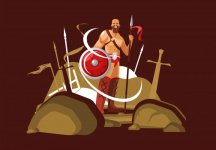I find the story of Prometheseus to be sad and interesting and I wanted to share. Yes, I like to study Greek mythology - I find it so fascinating!
Prometheus, a Titan in Greek mythology, occupies a unique space in the pantheon of myths due to his intelligence and his profound impact on human civilization. His tale is one marked by valor, insubordination, and enduring punishment, a narrative that has fascinated scholars and enthusiasts for ages.
Prometheus, whose name aptly means "forethought", was known for his wisdom and for being a champion of mankind. Unwilling to see humans suffer, he committed a daring act of defiance against Zeus, the king of the gods, which would forever alter the course of human history.
The most famous aspect of Prometheus’ story involves him stealing fire from the gods and gifting it to humanity. Fire, in Greek mythology, represents more than just a means to warm food or fend off the darkness; it symbolizes knowledge, technology, and enlightenment—tools that would empower humanity to shape their world, for better or worse.
Zeus, infuriated by Prometheus' transgression, sentenced him to a severe and enduring punishment. Prometheus was bound to a rock, where each day an eagle, the emblem of Zeus, was sent to eat his liver, which would then regrow overnight, only for the torment to repeat ad infinitum. It was an eternal punishment for a being who, in many accounts, acted out of compassion and foresight.
I find it sad that he did something so beneficial to humanity but then got punished for it.





